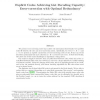534 search results - page 52 / 107 » Efficient polynomial L-approximations |
TIT
2008
13 years 7 months ago
2008
We present error-correcting codes that achieve the information-theoretically best possible trade-off between the rate and error-correction radius. Specifically, for every 0 < R...
EUROCRYPT
1998
Springer
14 years 2 days ago
1998
Springer
Abstract. Provable security is a very nice property for cryptographic protocols. Unfortunately, in many cases, this is at the cost of a considerable loss in terms of efficiency. Mo...
ICFP
2003
ACM
14 years 7 months ago
2003
ACM
Under the widely believed conjecture P=NP, NP-complete problems cannot be solved exactly using efficient polynomial time algorithms. Furthermore, any instance of a NP-complete pro...
DAC
2009
ACM
14 years 8 months ago
2009
ACM
Abstract--To reduce chip-scale topography variation in Chemical Mechanical Polishing (CMP) process, dummy fill is widely used to improve the layout density uniformity. Previous res...
SWAT
1998
Springer
14 years 1 days ago
1998
Springer
Given an alphabet , a (directed) graph G whose edges are weighted and -labeled, and a formal language L , the formal-language-constrained shortest/simple path problem consists of ...


